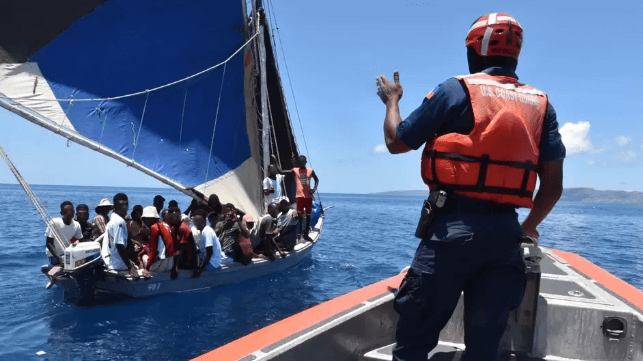Florida Prepares for Wave of Maritime Migration From Haiti

As Haiti's beleaguered security forces fight to keep criminal gangs from taking over the country, the state of Florida is taking measures to prepare for a potential wave of maritime migration. Haitian nationals regularly try to make the dangerous crossing to Florida, and thousands are intercepted by the Coast Guard every year - but the surge in violence and hunger in Haiti is widely expected to boost the rate of the exodus.
Florida Governor Ron Desantis announced Wednesday that he has dispatched another 250 state personnel to protect South Florida from maritime migrants. The force is made up of members of law enforcement, disaster response agencies and Florida's State Guard.
"No state has done more to supplement the (under-resourced) U.S. Coast Guard’s interdiction efforts; we cannot have illegal aliens coming to Florida," said DeSantis in a statement.
Once intercepted by Florida officials, though, it is unclear whether the migrants will be deported back to Haiti. The security situation is so severe that human rights groups have called for a temporary ban on repatriation.
In testimony before the House Armed Services committee, a top Pentagon official acknowledged that more migrants could be on the way.
"At the moment, we have not yet seen large numbers, what we would characterize as maritime mass migration," said Rebecca Zimmerman, Acting Principal Deputy Assistant Secretary of Defense for Homeland Defense and Hemispheric Affairs. "We are alert to that possibility . . . that the driving conditions in Haiti could very well press more people. We recently approved some additional assistance we could provide to the Coast Guard."

that matters most
Get the latest maritime news delivered to your inbox daily.
In addition to headline-grabbing levels of violence, Haiti faces a silent threat: hunger. Its main seaport has been shuttered by the threat of gang attacks, and shelves are running empty in the nation's markets. The UN World Food Programme (WFP) warned Tuesday that Haiti is approaching crisis levels of hunger, and that the violence is grinding aid operations to a halt. Even the WFP's prepositioned stocks in Port-au-Prince are unreachable due to fighting.
“We need to ensure security comes back to the country. We need the port to reopen and stocks to be replenished," WFP country director Jean-Martin Bauer said.
